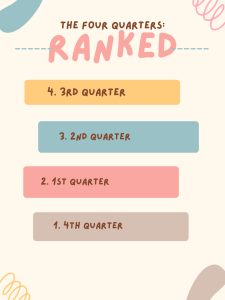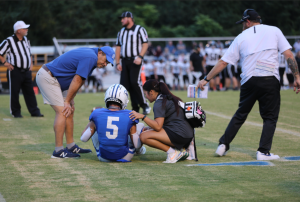The “Gluten Free” Diet Needs to Die
February 1, 2019
Imagine this: you are 11 and a half years old. You are sitting in the booth of a one of your favorite restaurants and tell your waiter that you eat gluten free. The waiter understands what you are saying, and he goes to find the owner of the restaurant to tell you what is safe for you to eat.
When the owner gets to your table, he lays out what on the menu does not contain gluten. All of your options are salads with the croutons removed. By now you have gotten used to your vegetable filled fate, and are not phased. You zone out and start deciding what to order while your mother explains to the owner why you are gluten free. Suddenly you hear something shocking come out of the owner’s mouth.
“You don’t really believe in the whole gluten free thing, do you?” he says.
Well, this was reality for 11 year-old me, and I was speechless. Yes, I believe in being gluten free, why would an 11 year old give up everything pure and beautiful in the world (bread, pasta, donuts, etc.) unless it was for a medical reason?
For context: I have celiac disease, an autoimmune disorder in which my body produces antigens that attack my small intestines instead of digesting gluten, which is found in wheat, rye, and barley. I had undiagnosed celiac until I was 11, which gave me a depleted immune system, malnutrition from lack of absorption in the small intestine, and a two year bone age delay that resulted in eight broken bones and a scoliosis brace. So even though I am still annoyed that I have not consumed a Goldfish since in five years, I know that living the gluten free life is definitely healthier for me.
When I told my friends of my new diet, they were supportive and glad that I would get better, but still had sympathy that I could no longer eat my favorite foods. However, I have had reactions from people that are not quite so nice such as, “wow, you’re allergic to carbs, you’re so lucky!” and “I think I would die if I had your diet!” But, the cream of the crop are the people who tell you, “I’m gluten free too!! It makes me feel so much better!!”
The most annoying are not the well meaning, misguided sympathizers, but those who choose to eat gluten free because it makes them feel healthier, whom I have labeled ‘fake gluten free people.’
These are the people do not have medical aversion to gluten. These are the people who shop at Whole Foods for everything, brag about their superfood salads, and voluntarily buy six dollar, tiny loaves of dry gluten free bread. These are the people who complain about how difficult being gluten free is and who whine about how tempted they are to cheat and eat some gluten. These are the people who make me so bitter.
‘Fake gluten free’ people have a choice. They do not get violent reactions that could send them to the hospital on their ‘cheat days’ and are able to have just one bite of cake when they ‘feel like being a little bad,’ because there are no real consequences for them. However, their attitude has real consequences for people like me, besides whatever mountain of personal annoyance they may bring. By claiming my medically required diet for themselves, they group people with celiac disease with them. The phrase ‘gluten free’ now has a connotation in society that implies the obnoxious trendy diet. It is the reason that one particular restaurant owner asked about my belief in the gluten free diet; his only interaction with gluten free people are the phonies who drive me so very crazy.
Being gluten free by choice is not that healthy anyways. You can still naturally eat candy, chips, and other junk foods. Pasta, pizza, cake, and bread can all be made gluten free as well, although they are never as good as the normal version. In addition, gluten free baked goods are often made out of more starchy bases, such as rice flour or potato flour, and use extra sugar to compensate for taste. So, if you think that being gluten free is healthier, you are fooling yourself. If anything, it contains more of the sugars and carbohydrates fake gluten free people are trying to avoid.
However vocal all the fake gluten free people may be, I am equally as quiet. People with gastrointestinal diseases have dignities too, which is why almost every person with celiac I know will give you a vague answer about what happens when we eat gluten. I know we don’t want to talk about our vomiting any more than you want to hear about it. And I get it, celiac disease sounds like a sham; you spend your whole life eating gluten and then boom, one day you’re allergic to bread. What you don’t see is the futile months of doctors appointments that always end with the same answer: some variation of sorta, kinda, maybe, I don’t know or try this new solution and go to another doctor. All of this, along with the influence of fake gluten free people has downgraded the severity of our allergies and downgraded my autoimmune disorder to nothing more than a fad.
“I don’t have an actual reason, I just feel better when I don’t eat gluten” is one of the worst things someone can say to me. Contrary to popular belief, this diet is not a choice, and those who do it for weight loss reasons or whatever other stupidity just reinforce this misconception. So, if you’re thinking about hopping on the gluten free bandwagon, please don’t. Give everyone over here at Dry, Tasteless Bread Central a gift and stop going gluten free for a week just for the challenge of it. It won’t do anything. All I ask is that you pick a diet that is actually healthy, and let us deal with our disease in peace.







